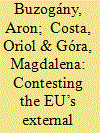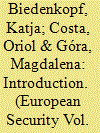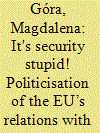|
|
|
Sort Order |
|
|
|
Items / Page
|
|
|
|
|
|
|
| Srl | Item |
| 1 |
ID:
187249


|
|
|
|
|
| Summary/Abstract |
This article analyses how populist parties in power contest the external democratization agenda within the European Union (EU)’s European Neighbourhood Policy (ENP). We present an analytical framework that conceptually unpacks both contestation and populism to argue that radical right, market liberal, regionalist and left-wing populist parties differ from each other concerning their views on external democratization. Our empirical focus is on the discursive strategies of Members of the European Parliament (MEPs) from PiS, Fidesz, Lega, Forza Italia and Movimento Cinque Stelle in European Parliament (EP) debates. The exploratory analysis reveals that populist actors rarely and selectively use the European arena for contesting democracy promotion. While an emphasis on stability and security in the neighbourhood prevails among all populist parties in our study, other considerations, such as migration policy, support for ethnic kin, suspicion towards Russia but also membership in the EP’s Party Groups inform the differences between the parties.
|
|
|
|
|
|
|
|
|
|
|
|
|
|
|
|
| 2 |
ID:
180557


|
|
|
|
|
| Summary/Abstract |
Contestation and politicisation are two concepts of increasing relevance to European foreign and security policy (CFSP) scholars and practitioners alike. However, reasonable doubts can be raised as regards this growing literature: first, political conflict has always been part of CFSP, and national and European politics have traditionally been at the centre of research in this field. Second, exploring how the two concepts relate to European foreign, security and defence policies is complicated by the fact that foreign affairs more broadly do not meet all the criteria set by the literature on politicisation, which usually requires that some form of mass mobilisation takes place, or at least a high degree of salience. This article addresses these concerns by looking at the changing politics of CFSP. As the introduction to the special issue, we explore the hypothesis that contestation of European foreign, security and defence policy is now more in line with the broader way in which political conflict is being re-structured in Europe. If this is so, political conflict over CFSP will more easily be associated with issues that have an appeal beyond the narrow community of its practitioners and observers.
|
|
|
|
|
|
|
|
|
|
|
|
|
|
|
|
| 3 |
ID:
180563


|
|
|
|
|
| Summary/Abstract |
The European Union’s security depends on how stable and peaceful its neighbours are, and yet the security situation around it has been deteriorating in recent years. The EU policies designed to stabilise the neighbourhood – the European Neighbourhood Policy (ENP) and EU enlargement – were originally designed as “low politics” of foreign policy focusing on economic instruments and tools of democratisation, but in time security became a prime concern. The article firstly shows how the European Parliament and national parliaments narrate these challenges in the neighbourhood and how security-related concerns become central to the ENP and enlargement. Secondly, in capturing the security concerns, it also shows how such changes contribute to the politicisation of relations with neighbours and how these processes differ between national and supranational level. Empirically, the politicisation of the ENP and EU enlargement in national parliaments (the UK, Poland and Ireland) and the European Parliament between 2004 and 2014 is compared and analysed.
|
|
|
|
|
|
|
|
|
|
|
|
|
|
|
|
|
|
|
|
|